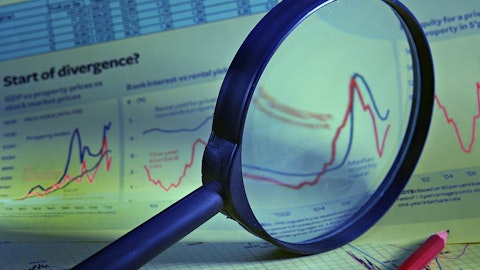I don’t think impatient shareholders understand that. But for people that like dividends, it’s great. But the reality of it is stocks are able to retain earnings and generate high return on common equity. You’re better off. I mean look what we can do with that money. It’s funny shareholders just say, “Well, gee, what did you do with your dividend?” Well, I held it in cash? Well, how did that do against inflation? Or I put it in the stock market that was down 20%. So I mean the reality of it is we’re still going to pay a very nice dividend, which will be qualified. We’re going to retain earnings, which is very beneficial to the company so we don’t have to dilute as much as we used to. And we’ve done the math. That’s going to work long term. And we will hit our metrics.
That’s where our head is at. That’s where our goals are at. And we start to hit these numbers, all of a sudden, you get your following, and that’s where we’re at. Right now, we’re picking up some institutions, which is valuable. Hopefully, we get included in the Russell, which will be very valuable. Hopefully, the 2.4 million short sellers will have realized, well, gee, now the dividend is declared and the party is over and the Seeking Alpha headlines are behind us and don’t do what they got to do with their 2.4 million shares short.
Scott Sullivan: Terrific. And you touched on this a bit, but can you give us more color into the state of your customers, the SMB market?
Barry Sloane: Well, look, it’s interesting in that our customers, they’re affected. Everybody is affected. The employees are affected. Customers are affected. To state that nobody is affected by a 450-basis-point interest rate hike would be just ridiculous. So for people not to expect a reevaluation of assets is just silly. I mean I don’t know where their heads are at. But it just doesn’t work that way. If you went to college, you got to figure out the cost of capital is higher. You run it through the model, and the assets are worth less. It just is what it is. Getting down to our business customers. Look, I have to say our business clients are there. Operators are entrepreneurs. And through COVID, a lot of people changed the way they do things.
They reevaluated their businesses. They got much more efficient. They got rid of things that were, frankly, wasteful because they were afraid they didn’t know whether this is going to be their last meal or they can leave their house. So a lot of them got more efficient. On the other hand, a lot of them didn’t. I say a lot of them, it’s a small percentage on the extreme that are good operators. And they’re going to have to deal with the fact that their interest expense is higher, and they’re going to have to be able to make those payments. However, a lot of them really got bailed out by the government subsidies of those three programs. So they’re in pretty good shape, and that’s kind of showing up in our numbers. Although we do anticipate that we’ll get back to more normalized historical charge-offs over time, and we think we’ve got the right math because we’ve done this for 20 years.




